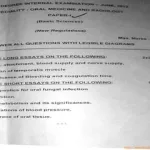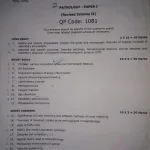General Medicine is an essential subject for BDS 3rd-year students, focusing on understanding systemic diseases and their dental implications. Preparing through comprehensive question papers helps students grasp important topics and excel in exams. This guide provides a collection of essential questions and answers for better understanding and revision.
General Medicine Important Questions and Answers
Question: Define anemia and explain its types.
Answer:
Anemia is a condition characterized by a decrease in the hemoglobin concentration in blood. Types include:
- Iron deficiency anemia
- Megaloblastic anemia
- Hemolytic anemia
- Aplastic anemia
Question: What are the causes of jaundice?
Answer:
Jaundice occurs due to hyperbilirubinemia. Causes include:
- Pre-hepatic: Hemolysis
- Hepatic: Hepatitis, cirrhosis
- Post-hepatic: Gallstones, tumors
Question: List the clinical features of diabetes mellitus.
Answer:
Clinical features include:
- Polyuria
- Polydipsia
- Polyphagia
- Weight loss
- Fatigue
Question: Explain the pathophysiology of hypertension.
Answer:
Hypertension is caused by increased peripheral vascular resistance or cardiac output. Factors include:
- Sympathetic overactivity
- Renin-angiotensin-aldosterone system activation
- Endothelial dysfunction
Question: What are the complications of hypertension?
Answer:
Complications include:
- Cardiovascular diseases
- Stroke
- Renal failure
- Retinopathy
Question: Describe the clinical features of hypothyroidism.
Answer:
Features include:
- Fatigue
- Weight gain
- Cold intolerance
- Dry skin
- Hair thinning
Question: What are the causes of chronic obstructive pulmonary disease (COPD)?
Answer:
Causes include:
- Smoking
- Air pollution
- Genetic predisposition (e.g., alpha-1 antitrypsin deficiency)
- Occupational exposure
Question: Explain the stages of chronic kidney disease (CKD).
Answer:
CKD stages are based on glomerular filtration rate (GFR):
- Stage 1: GFR > 90 mL/min
- Stage 2: GFR 60–89 mL/min
- Stage 3: GFR 30–59 mL/min
- Stage 4: GFR 15–29 mL/min
- Stage 5: GFR < 15 mL/min (end-stage renal disease)
Question: What are the symptoms of infective endocarditis?
Answer:
Symptoms include:
- Fever
- Fatigue
- Heart murmurs
- Petechiae
- Splinter hemorrhages
Question: Describe the treatment of peptic ulcer disease.
Answer:
Treatment involves:
- Proton pump inhibitors (e.g., omeprazole)
- H. pylori eradication therapy (antibiotics)
- Lifestyle modifications (e.g., avoiding NSAIDs, reducing alcohol)
Question: What are the causes of cirrhosis?
Answer:
Causes include:
- Chronic alcohol use
- Hepatitis B and C infections
- Non-alcoholic fatty liver disease
- Autoimmune hepatitis
Question: Define rheumatic fever and its major criteria.
Answer:
Rheumatic fever is an inflammatory disease following a Group A streptococcal infection. Major criteria include:
- Carditis
- Polyarthritis
- Sydenham’s chorea
- Erythema marginatum
- Subcutaneous nodules
Question: What are the clinical features of bronchial asthma?
Answer:
Features include:
- Wheezing
- Dyspnea
- Chest tightness
- Cough, especially at night
Question: Explain the pathogenesis of atherosclerosis.
Answer:
Atherosclerosis involves:
- Endothelial injury
- Lipid deposition
- Inflammatory cell recruitment
- Plaque formation
Question: What is the management of acute myocardial infarction (AMI)?
Answer:
Management includes:
- Oxygen therapy
- Aspirin
- Nitrates
- Beta-blockers
- Reperfusion therapy (thrombolysis or angioplasty)
Question: What are the causes of meningitis?
Answer:
Causes include:
- Bacterial (e.g., Streptococcus pneumoniae, Neisseria meningitidis)
- Viral (e.g., enteroviruses)
- Fungal (e.g., Cryptococcus)
- Parasitic
Question: List the symptoms of systemic lupus erythematosus (SLE).
Answer:
Symptoms include:
- Fatigue
- Joint pain
- Skin rash (butterfly rash)
- Photosensitivity
- Fever
Question: Explain the complications of diabetes mellitus.
Answer:
Complications include:
- Microvascular: Retinopathy, nephropathy, neuropathy
- Macrovascular: Cardiovascular disease, stroke
- Diabetic foot ulcers
Question: What is the difference between nephrotic and nephritic syndrome?
Answer:
Nephrotic syndrome: Massive proteinuria, hypoalbuminemia, edema
Nephritic syndrome: Hematuria, hypertension, oliguria
This collection of questions and answers for BDS 3rd-year General Medicine covers essential topics for thorough exam preparation. The structured format helps in easy understanding and efficient revision. Master these concepts for a solid foundation in systemic diseases and their dental implications.
Latest Posts
- Step-by-step guide to download and apply for jee mains admit card 202
- Comprehensive 2025 government holidays and recruitment details for job seekers
- JEE Mains Admit Card 2025: Your Step-by-Step Guide to Downloading the Hall Ticket
- Everything You Need to Know About 2025 Government Holidays Recruitment
- Comprehensive Guide to rrb d group recruitment 2025 – Eligibility, Vacancies, and Application
- Detailed guide to nps trust recruitment 2025 vacancies, eligibility and apply process
- Comprehensive guide to hpcl recruitment 2025 notification, vacancies, and application process
- ignou bed admission 2025 complete recruitment guide with eligibility and process
- Comprehensive Guide to Indian Army Agniveer Recruitment 2025 Notification and Jobs
- Everything You Must Know About CBSE Board Exams 2025 Changes & New Rules






